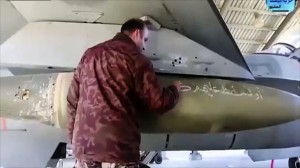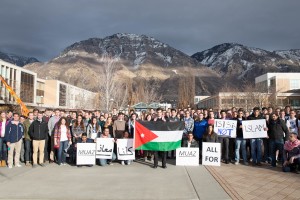
World leaders and community members alike have spoken out against violent extremism in the wake of the death of a Jordanian pilot.
BYU students gathered to mourn the death of Moath al-Kasaesbeh just hours after Islamic State of Iraq and Syria, ISIS, released the video of the pilot being burned alive. The Jordanian Air Force responded with fighter jets two days later, and President Barack Obama then petitioned Congress for new war powers to “ultimately destroy” the terrorist organization on Feb. 11.
“Its barbaric murders of so many people, including American hostages, are a desperate and revolting attempt to strike fear in the hearts of people,” Obama said. “ISIL is on the defensive, and ISIL is going to lose.”
The United States has joined military forces with the Jordanian government, which has increased the level of military action against the group. King Abdullah II Ibn Al-Hussein of Jordan donned his uniform and served as a jump-master for a training mission, authorized a mission named “Moath the Martyr” and claims the destruction of several ISIS training facilities.
The pilot’s death serves as a sobering platform for Muslims around the world to speak out against the terrorist group with members of other faiths to denounce any would-be religious ideas that violate human rights.
“It’s not Islamic; its Satanic,” said Dr. Muzammil Siddiqi in an interfaith address to Salt Lake City residents on Feb. 6. Siddiqi studied comparative religion at Harvard and has spent much of his life condemning acts of terror that claim association with Islam.

BYU students echoed this sentiment. “ISIS is not Islam,” read a poster held during the vigil in Brigham Square. The vigil was extended to a prayer meeting in which both Christian and Muslim prayers were offered in memory of the pilot.
The Islamic Society of Greater Salt Lake silently mourned the pilot’s death. The organization urged society members to continue to live peacefully and attend vigils if invited but refused to hold one of its own.
“If we do a vigil it means that we are acknowledging that it is something that Islam has done and that we have to make some sort of a statement against it,” said Islamic Society member Noor Ul-Hasan. “We prefer just to attend vigils when they are held.”
Siddiqi said the fight against extremism begins in communities, urging attendees to listen to the quiet voices of good people they know.




